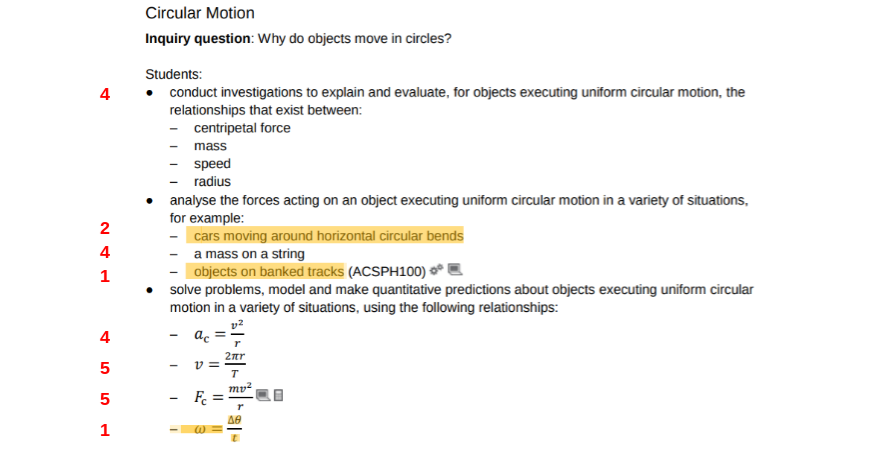Just finished Trials? Congrats! BUT, unfortunately the study isn’t over just yet. It’s time for you to create a HSC Physics study plan!
The time between Trials and the HSC exam may be the most important period of all. There’s about 50 days of study you can fit in!
So, learn what it takes to make the most of your HSC Physics study plan in this article!
Step 1: Unclutter your mind
Step 2: Organise your workspace
Step 3: Figure out what you want to achieve
Step 4: Identify areas for improvement
Step 5: Figure out how much time you really have
Step 6: Complete past papers
The 6 Week Plan of Attack
Step 1: Unclutter your mind
Towards the end of the year, it can feel like you have so much stuff to do, it can be overwhelming. The worst thing you can do is keep all that anxiety in your head.
Dump it all out of your brain and into a to-do list.
You’ll be less likely to forget stuff, and it gives you some focus on what to tackle next. You’ll be surprised, once you have all the things you need to do in front of you, it can be eye-opening.
I’ve found that in the past I’m not actually stressed out because I have too much to do, it was just one particular item that was getting me stressed. Once I identified it, I was able to prioritise it and take appropriate action.
I also find that while I often feel defeated and overwhelmed before laying it all out in a to-do list, as soon as I do it, I often start having strategic visions about which things to knock-over first.
All of a sudden I can see a game-plan emerging and I feel better. Maybe even motivated!
There are so many options for to-do lists out there.
You may prefer to go with something simple and just write down a list on a sheet of paper. Maybe you prefer to nerd out and get a serious task management app (MeisterTask is pretty awesome!).
I guarantee you there is something to suit your needs, just don’t try and keep everything in your head.
Step 2: Organise your workspace
Before you get down to business, you need to make sure the environment you’re going to be working in is fostering your productivity not hindering it.
Try and get all your notes organised before you begin, the worst thing you can do is have a mountain of paper on your desk.
The desk becomes uncomfortable to work on, and you can’t find any of the sheets you need!
I recommend getting yourself a set of 4 folders for HSC Physics:
You’ll want to use a folder for each module (i.e. that’s one for Advanced Mechanics, Electromagnetism, Nature of Light and From the Universe to the Atom)
The front few pages of each folder should have the relevant section of the syllabus. Print that out straight away as a starting point.
When you’re looking for a particular set of notes, you won’t have to trawl through heaps and heaps of paper, just look through the relevant folder!
If you traced how much of your “study” time you burn through by trying to locate old worksheets or prac write-ups buried in a year’s worth of notes, you’d likely be aghast!
Step 3: Figure out what you want to achieve
Now that your workspace is sorted, ask yourself what you want to achieve.
Let’s get real for a minute – studying is really boring. Don’t get me wrong, I found the physics really interesting, but the actual studying part, going through the syllabus, and memorising things, I’ll be honest, it was mind-numbingly boring.
If I didn’t have any motivation for studying, I wouldn’t have! It’s just too boring! I’d rather have played Tennis, or video games or watch Netflix.
The reason I was able to stay focused was because I had goals I really wanted to achieve!
Goals that were meaningful to ME, not my parents and teachers. I was doing it for me.
While I was bored with the study process, I was excited envisioning the great self-made outcome at the end! Focus on that!
Do you have a dream career path or a particular ATAR you’re aiming for? Whatever your goal is, make sure you have one, and that it means something to you!
Step 4: Identify areas for improvement
Now, it’s time to go through each dot point and rate your understanding on a scale of 0 to 5:
0 = If I was asked this in an exam, I’d get 0.
1 = I might scrape a pity mark for mentioning the right word.
2 = I understand the gist of the dot-point, but am unsure of some parts.
3 = I know the answer, but can’t explain it to you.
4 = I can explain the answer, but I don’t know if I can write it down.
5 = If I was asked this in an exam, I would DEFINITELY get full marks.
Highlight any dot points which received a score less than or equal to 3.
We will attend to the dot-point which scored 4 and 5 later, for now, let’s prioritise the more urgent ones!
Before you just rush in head first, it’s worth considering why you found a particular dot point unclear. If you can identify why it was confusing the last time, you’re unlikely to run into the same pitfalls.
Was it due to tiredness when studying that part? Did you get confused in class? Is the textbook you used unclear?
If the answer to any of these questions is yes, perhaps you need to consider using another source! It’s often really elucidating to hear something phrased a different way by a different writer!
You’ll want to scrutinise your past exams in a similar fashion. There is a lot you can learn from errors you have made in the past.
Do you frequently make mistakes with calculations? Are these mistakes in a particular topic, like projectile motion or special relativity?
You need to examine where the mistakes are coming from and how you can prevent them. Our HSC Physics Tutors can support you with tailored 1-1 tutoring in the lead up to your HSC exams.
Here’s a game-changing tip: When you pull out your Advanced Mechanics folder to start plugging the gaps you want to target (to get yourself to the top of your game), you’ll thank yourself non-stop if you left all your mistakes there in all their glory.
Think about it: You haven’t seen circular motion since module 1 of year 12 (which was in the last term of the year 11 year) and here you are a week out from the Trial HSC exam.
Sometimes there are just mistakes you’re destined to make, which is just something to do with the way your brain works in particular.
If you pull out your folder and all those mistakes are not censored by white-out, but are sitting there staring at you, your thought process clearly displayed with a little note you wrote next to it nearly 12 months ago saying something like:
“Remember: torque only changes angular velocity – you don’t need torque to keep it spinning!!”
… you’ll almost want to go back in time and thank yourself in person!
Step 5: Figure out how much time you really have
It’s really easy to overestimate how much time you have until the exam. The HSC exams begin in the third week of October and run to mid-November.
The HSC Physics exam for 2019 is on Monday, 11th November in Week 5 of the exam period.
That may seem like it’s quite a while away. It’s not. Trust me.
You don’t have one subject to study for, you probably have around 5 – if not more!
Whatever time you think you have, you can go ahead and divide it by at least 5. Now let’s be realistic, you have to eat and sleep, you’re not a 100% efficient studying machine, you’re a human! We spend about a third of our lives asleep!
Counting the weeks until your exam is a sure-fire way to mislead yourself, you’ll want to count in days and hours.
While school’s still on, you really only have a few hours each night to study. For most people, it’s probably around 2 hours. Let’s consider a scenario. You’re doing 5 subjects and have 50 days till the Physics exam.
50 days / 5 = 10 days
10 days * 2 hours = 20 hours
As you can see that’s not a lot of time.
“But school will finish and I’ll have more time to study!”
What I’d say is that the monkey brain we have evolved from is easily distracted. So, don’t count on that extra time. This conservative estimate can be surprisingly accurate!
The general rule is that big projects like “Achieve a band 6 in Physics” or “Walk on the moon by the end of the 1960s” usually expand to fill all the time available (completely).
The good news is, there is one loophole you can exploit! This calculation doesn’t account for the time you have during school!
The school term is coming to a close, and so is the teaching period. Before this occurs – in these final weeks – you’ll want to approach your teachers and clarify all the doubts you identified in your syllabus audit and in your error log.
If you’d like more details on how to examine your errors, or if you’re unsure what to ask your teacher, check out this article!
Step 6: Complete past papers
One of the easiest ways to get feedback on how prepared you are for the exam is to start doing past papers.
That being said, don’t just try and smash through the papers year by year, they’re 3 hours long!
Also, we have a finite amount, which means you don’t want to ‘waste’ them right now, but when you’re ready.
You don’t want to be doing entire papers in one sitting over and over. It’s too hard to stay focused for that long (your brain knows the stakes aren’t that high yet).
In the actual exam there’s pressure and consequences that can give you focus you never thought you had. That sort of pressure is very hard to replicate at home.
Plus, if you do that too many times you end up re-practicing questions you’ve already mastered and got in the bag. Remember, your time is limited. Efficiency and studying smart is the name of the game!
A fantastic approach is to complete the papers by module.
Studying by module is a clever way to exploit the limited time you have. There’s no reason you have to wait until you’ve finished studying all the modules.
As soon as you’re done revising Advanced Mechanics you can do all the Advanced Mechanics questions from the NESA past papers and sample examination questions here. The sample questions are already arranged by module for you!
This can especially be a good strategy if you want to give full attention to one module in particular that you feel less confident about and want to prioritise!
This way you can complete a module within 45 minutes. It’s a far more approachable way to complete past papers.
If you want to get used to finishing with spare time for answer-checking, see how you go with 38 minutes (set a cooking timer!).
The 6 Week Plan of Attack
Here’s a possible approach that would allow you to finish 7 past papers in 6 weeks, that’s 21 hours worth of exams!
Week 1: Setting up
- Create todo list,
- Set up workspace,
- Identify goals,
- Calculate time remaining.
Week 2: What do I need to work on?
- Syllabus audit,
- Clarify doubts with teachers,
- Update todo list.
Week 3: Mastering Module 5 Advanced Mechanics
- 20 minutes studying troubling dot points from Module 5 each night,
- Clarify doubts with teachers/coaches,
- Complete 1 paper a night (Just one module of course! This should take 40-45 minutes tops. DO NOT do 3 hours of physics papers a night, this is unfeasible unless you’re a robot.)
Week 4: Mastering Module 6 Electromagnetism
- Same process as week 3, but for Module 6!
Week 5: Mastering Module 7 The Nature of Light
- Same process as week 3, but for Module 7!
Week 6: Mastering Module 8 From the Universe to the Atom
- Same process as week 3, but for Module 8!
And there you have it, your very own HSC Physics study plan! Tweak and rework and make your own in any way you feel! Good luck!
Looking for some extra help with HSC Physics?
We pride ourselves on our inspirational HSC Physics coaches and mentors!
We offer tutoring and mentoring for Years K-12 in a variety of subjects, with personalised lessons conducted one-on-one in your home or at our state of the art campus in Hornsby! Check out how our tutors in Liverpool can enhance your results for any subject!
To find out more and get started with an inspirational tutor and mentor get in touch today!
Give us a ring on 1300 267 888, email us at [email protected] or check us out on Facebook!
Vamsi Srinivasan is looking to uncover the next hidden truth of the universe. He was so fascinated by the beauty of Physics and Mathematics during his HSC that he went on to study Physics at University. He is now in his second year of a dual degree in Physics/Computer Science. He loves physics and maths so much, he wanted to share his passion and has been an Art of Smart coach for the past 2 years. He’s helped coach students in physics as well as all ranges of HSC Maths from General to Extension 2. In his spare time you can find him watching Tennis or Formula 1 or perhaps listening to his favourite podcast ‘Hello Internet’.









